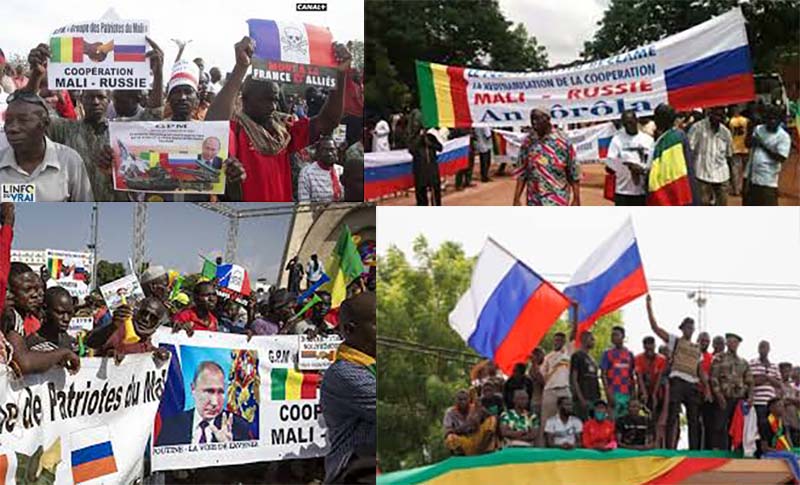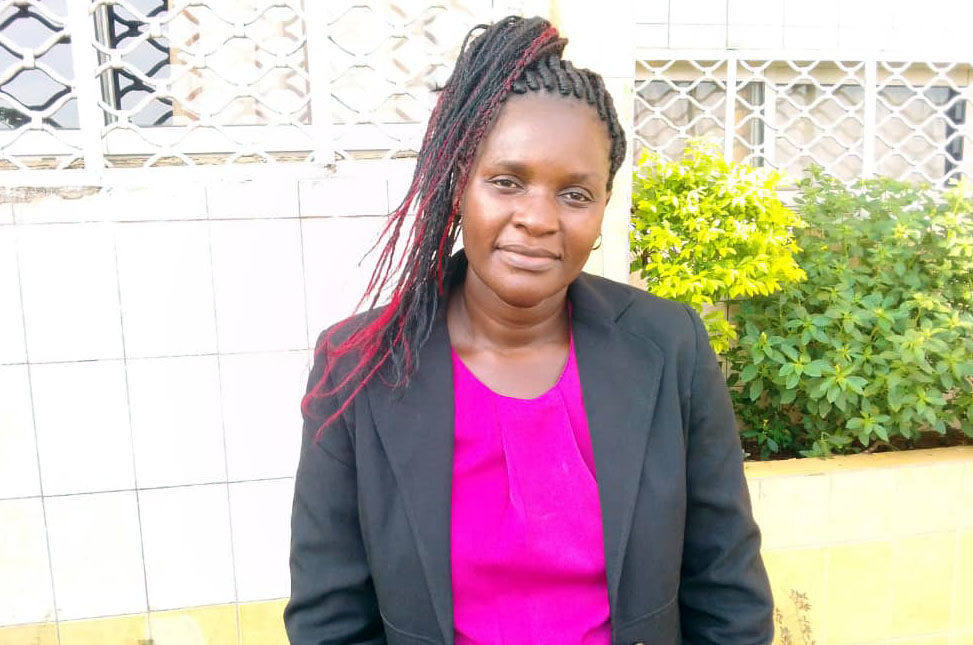ANALYSIS. For more than half a century, Africa has always been coveted by the Western powers to make it their own hegemony site. During the Second World War in 1945 and the Cold War period, the African people fought alongside the Allied forces to defeat Adolf Hitler’s dictatorial regime in Germany.
By Lilian Neg, Africa Correspondent for NewsVoice | Lire l’article en français | Read this article in Russian
This situation, well known by The Union of Soviet Socialist Republics (USSR), was their Leitmotiv to occupy a prominent place in Africa a few decades later, even though the Soviet Union had not taken any interest in colonization.
Africa then presented herself as the focal and strategic point of attraction. But what could be the reason? To understand the relevance of the analyses based on the recent Russo-Ukrainian war, four major points will hold our attention.
History
After the period of decolonization in Africa, the Soviet Union quickly understood that the fact she had not taken an interest in colonization was a great handicap in view of the offensive policy she wanted to lead against the Western powers.
That is why, to remedy this, USSR decided to join with the underprivileged peoples to fight against colonization.
This is the case in South Africa where she supported the ANC movement, the South African Communist Party (SACP), the Popular Movement for the Liberation of Angola (MPLA), the Mozambican Liberation Front (FRELIMO), and finally the Zimbabwe African People’s Union (ZAPU).
In 1960, at the initiative of the USSR, The General Assembly of the United Nations adopted the declaration on granting independence to colonized countries and peoples despite the opposition of some major Western states.
In addition to that, a large number of African leaders benefited personally from the support and training offered by the USSR, not to mention the thousands of experts trained by the Soviet advisers. Many agreements signed during this period included 37 technical and economic assistance pacts and 42 trade agreements.
After the dismantlement of the USSR, Russia inherited the gains of this union and it was in this context that she continued the initiatives of the former Soviet Socialist Republic by maintaining the cooperation agreements.
It was in this spirit that, in 2006, Vladimir Putin visited South Africa and Morocco, while Dimitri Medvedev accompanied 400 businessmen on an official trip to Angola, Namibia, and Nigeria in 2009 to sign economic agreements in the mineral resources and nuclear energy sectors.
These two moves illustrated the establishment of new bilateral relations. Russia then positioned itself as a strategic partner and has been wearing this cap for more than half a century. A position that scares the West and its allies.
Political aspects – Françafrique
The conflict between Russia and Ukraine has made it possible to understand the polarization of the world with, on one hand, the States that support the Russian escape from the Ukrainian territories following the discontent caused by the controversial presence of NATO and the monitoring of the Russian speaking territories, and on the other hand, the States that are against any Russian intervention in Ukraine in view of the policy propagated by Vladimir Putin, the so-called policy of reclaiming the territories lost after the dissolution of the USSR.
Russia wants to create a new world order based on bilateral and multilateral cooperation whose interests are diversified, and which directly benefits the contracting parties. This new form of policy is attracting the majority of African countries, which after the Independence were subjected to a system called Françafrique.
”The term [Françafrique] was derived from the expression France-Afrique, which was used by the first president of Ivory Coast, Félix Houphouët-Boigny, in 1955 to describe his country’s close ties with France. It was later renamed Françafrique by François-Xavier Verschave in 1998 to criticize the alleged corrupt and clandestine activities of various Franco-African political, economic and military networks”. – Wikipedia
Most French-speaking countries have not been able to benefit from this neo-colonialistic system specific to France. The African countries submitted, dominated, and cut at the mercy of the West had a desire for emancipation, that is to break with the old system, and create their own money.
The African states jealous of their sovereignty are looking for new partners, and Russia present herself as the ideal. Recently, Mali, the Central African Republic, and Cameroon have signed cooperation agreements with Russia in the defense field. Also, other African countries have concluded agreements in the field of education, health, oil, and energy resources.
Africa’s dependence on the old continent is gradually declining. At this stage of analysis, it is fair to think that the Russian invasion of Ukraine is becoming embarrassing for Western democracies. Africans have understood that there is no need in considering the Western view of democracy because they are in support of most dictatorial regimes in Africa.
The primary consequences have been misery, poverty, and underdevelopment in Africa.
After more than half a century of ”independence”, what is Africa’s real place on the global agenda?
The Russo-Ukrainian war also allowed the whole world to understand that there is no freedom of opinion and thought because all political statements coming from the West are based on a kind of support either for Russia or Ukraine.
This so-called policy of alignment has for a long time weakened the African continent which, under the influence of the West, prefers to take ambiguous positions in order to be neutral.
In this light, Africans must only focus on their interests and the balance would weigh on win-win diplomacy, that is why President Volodymir Zelensky’s cries of distress are sounding in vain in Africa because they are concerned about their disastrous economic situation.
Diplomatic and Strategic views
On the diplomatic and strategic level, Yet having no colonies in Africa, Russia has managed to create a fairly powerful alliance with African governments.
It is true that the governance systems are modeled on the Western, but people are beginning to change their position. Africans increasingly demonstrate their interest in Russia and wish to maintain permanent cooperation.
The opening of Russian embassies in almost all African countries is a victory for Russian diplomacy which is on the offensive in Africa.
The recent official trip of French President Emmanuel Macron to Africa from 25 to 27 July 2022 in Cameroon, Benin, and Guinea Bissau and the visit of the Minister of Foreign Affairs Serguei Lavrov and spokesman of the Russian diplomacy in Egypt, Congo, Uganda, and Ethiopia are warning signs that are sufficient to show that Africa is becoming very coveted, the war in Ukraine in this context then is the reversal of a real cold war between two strictly opposite systems, of which Africa is the thermometer.
Once considered as bargaining for Western powers, Africa is today a space of competition between powers, former colonial powers and emerging countries such as China, India, Brazil, and Turkey, all secular arms of Russia in its eternal geopolitical and geostrategic struggle against the Western countries and their allies such as the United States of America.
Russia’s renewed interest in Africa is gaining momentum following the sanctions imposed by the European Union and the United States after its invasion of Crimea and especially the creation of the Asian Euro Economic Union, which is perceived as a blatant intrusion of the European Union and the United States in the heart of former Russian colonies.
As a result, Russia repositioned herself in Africa to respond to the West’s demand for Asia in a flagrant violation of the “YANTAI” agreements. And also to evade sanctions imposed on her by the European Union. But this redeployment of Russia in Africa will not remain without consequences.

African economies are threatened by the war in Ukraine
The war in Ukraine has been devastating for African economies because, as a result of the cooperation agreements, most factories derive their raw materials from Russia and a small percentage from Ukraine.
The embargo imposed on Russia was the source of this grave situation.
The first consequence was the increase in the price of basic necessities, building materials such as cement, iron, and energy resources coal, gas, and its derived products are not to be neglected.
The situation is becoming more and more catastrophic since it affects consumer goods, and foodstuffs negatively. It is important to know that this war has allowed Africans to see their economic dependence on Russia to the detriment of Western Europe, which they had always considered their first partner.
In addition to that, the local African currencies have lost their value. Concerning countries sharing the franc zone, there is a reason to think about a bypass plan. The scarcity of products is being felt on the market.
Dissatisfied with the situation, the citizens accuse their respective governments of not having been relevant enough in taking a position either in favor or against the war in Ukraine.
For other Africans, the war in Ukraine is entertainment that prevents them from reflecting on their own concerns because according to the latter this war benefits only the great powers, and finally, to the most radical, the war in Ukraine is only a means used by the western democracies to impose an order of alignment on Africans.
Banning Russian products will permit the weaker African countries to turn their backs on Russia and concentrate on Western Europe. This statement is far from being a reality because the majority of countries have maintained their trade agreement despite the visible consequences on the ground.
The invasion of Russia in Ukraine issue remains for Africans a Western affair whose repercussions are considerable in Africa. In view of the above, Africa occupies a geostrategic place, and aware of these stakes, Africa must take advantage in order to better safeguard its interests.
By Lilian Neg, Africa Correspondent for NewsVoice

